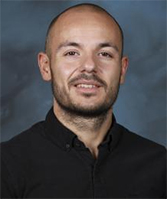Seminars
Dr. Massimiliano Lupo Pasini
Computational Sciences and Engineering Division
Oak Ridge National Laboratory
Deep Learning for Prediction of Material Properties of Solid Solution Alloys from Multiscale Information

ABSTRACT: Discovering and designing a solid solution alloy with desired structural and thermodynamic properties require exploring a high dimensional material space at various scales, which is computationally expensive and sometimes even unfeasible. Deep learning (DL) surrogate models offer a promising path to circumvent this limitation because, once properly trained, they provide fast and accurate estimates of material properties. The training of the DL models requires: (i) expert-driven collection of material data and (ii) customized design of DL architectures to leverage the connection between the topological properties of the data and the physical correlations among material properties. In this seminar, I will present the application of two different DL models to the material design efforts conducted within the Artificial Intelligence for Science and Discovery (AISD) thrust of the ORNL Artificial Intelligence (AI) Initiative. Specifically, we developed and applied: (i) a MultiLayer Perceptron (MLP) model to predict lattice parameters and Gibbs free energy of solid solution alloys as a function of composition and temperature and (ii) a Graph Convolutional Neural Network (GCNN) to predict the mixing enthalpy, atomic charge transfer, and atomic magnetic moment of binary solid solution alloys as a function of composition and atomic configuration.
BIOGRAPHY: Massimiliano (Max) Lupo Pasini is a Computational Scientist in the Scalable Algorithms and Coupled Physics group at the Computational Sciences and Engineering Division at Oak Ridge National Laboratory (ORNL). He was previously a Postdoctoral Researcher Associate in the Scientific Computing group at the National Center for Computational Sciences (NCCS) at ORNL. Massimiliano's research at ORNL focuses on the development of hyper parameter optimization techniques for DL models and acceleration of computational physics applications using DL techniques as surrogate models. Massimiliano obtained his PhD in Applied Mathematics at Emory University in Atlanta (GA) in May 2018. The main topic of his doctorate work was the development of efficient and resilient linear solvers for upcoming computing architectures moving towards exascale (10^18 FLOPS) capacities. Massimiliano obtained his Bachelor of Science and Master of Science in Mathematical Engineering at the Politecnico di Milano in Milan, Italy. The focus of his undergraduate and master studies was statistics and discretization techniques and reduction order models for partial differential equations.